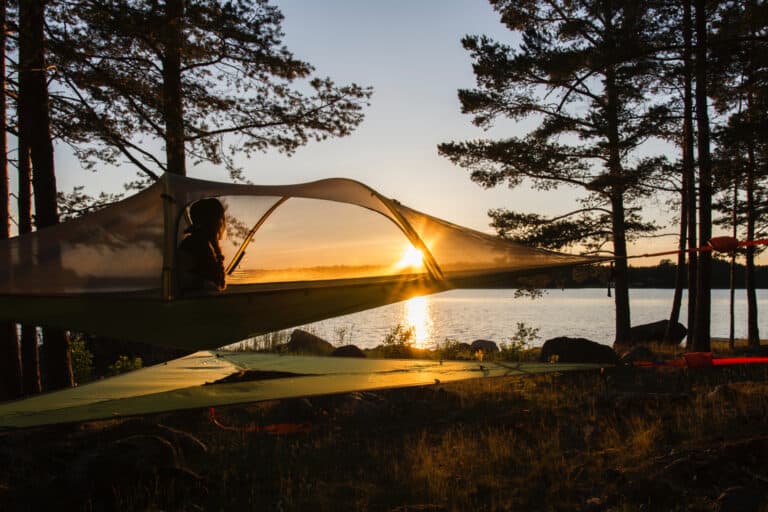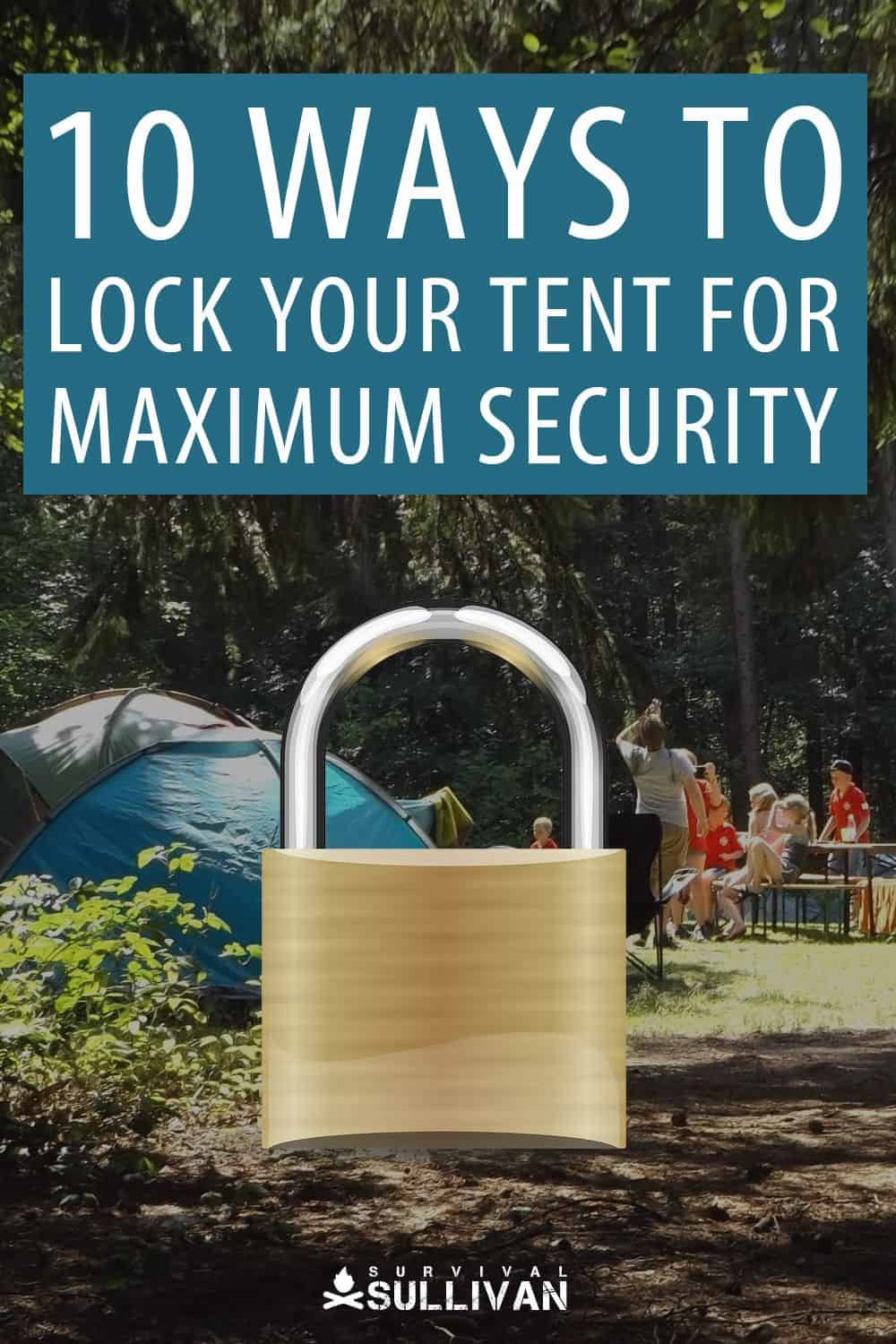“How do I secure my tent?” is a question often asked by campers worried about human and animal incursions, both during the day when campers may be out hiking, fishing or swimming and, perhaps even more scary, at night when they are sleeping inside the tent.
There are locks available and a few tricks to locking your tent, but then there are a few other more high-tech developments that can help keep you, your family, and your possessions safe when enjoying the great outdoors.

Basic Locking
You can either lock two zippers together with a padlock, making it much harder to open the door, or you can lock a zipper to a heavy or ground secured object making the zipper harder to move, such as a tool case or a refrigerator – you will need a length of chain to make it reach.
Try however, not to advertise the fact that your tent is locked – people just assume a lock means there are valuables left inside.
It’s better to leave valuables out of sight in a locked motor vehicle. Lock the tent zippers from the inside at night, and if going out during the day, hide the lock behind a tent flap or other item of camping equipment.
Disclosure: This post has links to 3rd party websites, so I may get a commission if you buy through those links. Survival Sullivan is a participant in the Amazon Services LLC Associates Program. As an Amazon Associate, I earn from qualifying purchases. See my full disclosure for more.
An alternative to the basic padlock is the combination lock, but this requires you to lock it on the right number in order to open it.

Kids are often in a hurry and get the numbers scrambled resulting in someone having to cut the lock off, so for kids probably a better system is the fingerprint padlock.
This particular fingerprint identification lock will accept up to 10 different fingerprints, so for a family tent it is ideal, especially when you have just decided to head out on the trail and various family members have forgotten an item of ‘major importance’ and have to dash back into the tent in turns as they remember.
Of course, they never all remember at once, no matter how many times you remind them – “Have you got your cap / sunscreen / shoes / snacks / water bottle?”
The trusty little padlock available from hardware stores, supermarkets, or online, is fine if you are camping alone or there are just two adults.
With one key tied to your shoelace or safely secured in a backpack, the other key is usually hidden in a secure spot somewhere around the campsite – not under the front entrance mat please. The two-key padlock with a number of people in a big family tent can be problematic though.
Despite locking them, tents can easily be accessed by using a knife and locks are only a deterrent, not a foolproof system, so for maximum security use a lock in conjunction with perhaps one of the systems discussed below.

Tripwire Activated Tent Alarm
This little battery-operated BASU alarm is one to keep inside or outside the tent as it is small and unobtrusive.
Rig the pin with fishing line and clip it to something solid in the tent at night so if someone or something tries to come in and stumbles against the trip wire the pin pulls out, and the alarm will definitely be loud enough to wake up the campsite and send intruders scuttling.
When going out for the day, rig it to an item like a cooler box or camp chair outside the tent with the tripwire set near the entrance so if someone comes to fiddle with the lock the pin pulls and you have a very noisy alarm.
Just remember to deactivate it when you get back from your hike or fishing trip, otherwise there may be some swearing from family members ‘caught’ by the alarm.
The alarm is useful for taking along on hikes too, so should you come across unwanted attention from humans or animals you can just pull the pin yourself, and it will make plenty of noise.

Motion sensor Lighting
Turning the lights on thieves at night usually makes them run for the cover of darkness. When you lock your tent you can also set up motion detector lights that will come on if the intruder crosses a beam at a certain point close to your tent entrance.
You can fine one that is solar-powered, and can simply be stuck in the ground close to the tent, lighting up the area so you can peek out and see what is causing the light to turn on – people, raccoons, bears, or simply one of your camp buddies stumbling home late.
Because its low-tech you don’t have to worry about cell phone coverage and simply let the sun power it up, stake it into the ground and there you go, an added level of security to the padlock on your tent.

Camera Units
More advanced camera units have the sensor linked to your cell phone, so you can monitor what is happening within your tent while you are out.
An alternative is to set it up just outside the tent entrance so you can monitor what is happening outside while you are inside. This of course only works in terrain where you have cell phone reception.

Monitoring Your Tent While You Are Way
A lock can easily be picked, sawn off, or the tent wall slashed, for people to gain access. With this detection kit you can set up the system and know that depending on line of sight there is around a two mile radius for the transmitter broadcasting on the MURS frequency.
So if you are away from the tent fishing nearby it is perfect as you will know when someone is fiddling around your stuff, but if setting off on a long hike, it will not be effective unless you have someone else in the campsite (or nearby) who can monitor what’s going on with the hand-held radio.

Buried Cable Detection
The buried cable system can come embedded into a mat or can be laid underground but is not a system suited for a weekend, or even a two-week camping trip.
Besides the cost of either the mat system, or the buried cable system there is also the labor involved in burying the cable, making this system probably better for a more permanent camp or bug out situation where you need covert perimeter protection.
In contrast, The Brite Strike Camp Perimeter System has sensors to let you know whether something is around plus a number of other features like alarms, but this unit is not waterproof and users have complained of this, so if using it make sure it is housed under cover.
There are some other perimeter sensors available on the market that simply do not live up to their hype. For instance, who wants a perimeter alarm sensor that cannot stand up to even light rain if it is advertised for camping?
It just seems to be Murphy’s Law that if you go camping, even in the dry season, there is bound to be some rain or drizzle or heavy dew that will wet sensitive equipment. Often the simpler systems are the best, like the P Locks, or rain resistant motion detector lights.

Infrared Sensors
With a two-column active infrared technology system there is a transmitter emitting invisible beams in one column, then the receiver unit in the other column to analyze the beams, and detect the presence of intruders breaking the beams.
The unit works on sensing heat radiation form an intruder, be it human, bear or coyote, that shows up as a different temperature compared to the background environment.
As with all things in life, the more expensive the item the better quality. Units that are built tough to withstand temperature extremes and changes in the environment and that will give reliable and constant protection due to their self-adapting inbuilt technology, will cost a reasonable amount.
If starting out with this technology you may want an entry level infrared sensor for camping. This wireless system that works with 2 AAA size batteries should cover the entrance to the tent.
As with all electronics even if the claim is that they are waterproof rather set it up under the awning in front of the tent where it does not get moisture, and after use pack in a container with silica gel (desiccant) to keep moisture away.
Tin Can Tripwires
So, you locked your tent for the night, but you want advanced warning before someone is actually fiddling at the lock, or slitting the side of the tent in the night, to extract your possessions.
Go low tech, and set up a fishing line threaded through two holes punched on the sides, near the top, of a number of tin cans, around the perimeter of your site.
To use cans for this, you have to open them enough to bend up the lid and use the contents, then wash. Place a few marbles inside the cans before bending the lid closed.
Any person on animal wandering close to the tent will activate the trip wires, which can be fastened between tent poles or in-between trees to secure the area around the tent.
This system is best used at night and set about two feet off the ground. You can paint the cans black so the silver is not reflected by the moon or other ambient lighting.
This system will not work if it is windy – you will simply keep everyone awake with the jangling, earning you plenty of unwelcome comments from irate fellow campers.
If you want to protect your tent during the day, then attach the tin can tripwire to one of the zippers, and secure the other end to something heavy within the tent, or to a pole inside the tent. If someone removes the lock and tries to open the zip the cans will start jangling.
This is only useful if there are other people around the site to react to the alarm. Zippers usually come with two pulls – one inside and one outside – so make sure the fishing line is attached on the inside pull so as not to alert the intruder.

Chaining up Your Tent with P-locks
This simple anchoring system to protect your tent, bicycles and other camping equipment, is made of cold rolled steel and needs no tools to install.
Once you screwed the P-locks into the ground, place the U shapes together and place the lock through the U pieces. This protects your tent from opportunistic thieves.
To pull the P-locks out of the ground by force, you’d need 1,700 lbs vertical and 2,900 lbs horizontal pressure, but they are easy for the owner to remove once they are unlocked. To protect your tent or your goods with this relatively simple and light system is worth it, and the system has consistently good reviews from those who have used it.
Guard It
If you are in a large group and worried about security, it is possible to hire a guard to watch over your locked tents. The guard can be supplied by a security company, or you can hire two trained people yourself.
They will need to take shifts to look after your site, and will need a tent themselves, and you’ll need to discuss payment and whether food and camp sites fees are included in the daily rate or whether you must cover these costs as well.
Tips on Siting a Tent for Security
If you are the only person camping in an area, then by all means conceal your tent away from the road and hidden from. View so no-one knows you are there.
However, if you are camping in an area where there are a number of other campers remember the tents on the perimeters will be hit first – it’s a quicker getaway for would be thieves than wandering right into the campsite. Avoid camping near a road – it’s again an easier getaway for a thief with a vehicle.
Look out for your neighbors, and they will look out for you. Maintain vigilance and chat to other campers to make sure any strangers wandering in are just that and not perhaps late arrivals coming to join their group.
Installing another level of security like one of those we have suggested will provide you with some back-up, and some peace of mind when camping.


Traveler, photographer, writer. I’m eternally curious, in love with the natural world. How people can survive in harmony with nature has fueled my food safety and survival gardening practices.
At the age of 12, I found a newspaper advertisement for a 155-acre farm at a really good price and showed my parents one Sunday morning. They bought it and I happily started planting vegetables, peanuts, maize and keeping bees with the help of the local labor.
Once I married wherever we moved it was all about planting food, keeping chickens and ducks, permaculture and creating micro-climates. I learned how to build wooden cabins and outdoor furniture from pallets, and baked and cooked home-grown produce, developing recipes as I went along.

Hello;
I hate to rain on your parade but. A tent or even a camp trailer/motorhome can be opened like it had a zipper with a stout knife. Security around these requires a person and it could require an armed person to handle it. No padlocks will keep anyone out if they want in.
RD
It is mentioned several times throughout the article that “despite locking them, tents can easily be accessed by using a knife and locks are only a deterrent, not a foolproof system, so for maximum security use a lock in conjunction with perhaps one of the systems discussed below”
I believe everyone is well aware that any thief could gain access if they really wanted to, but the goal of this article is to deter them.